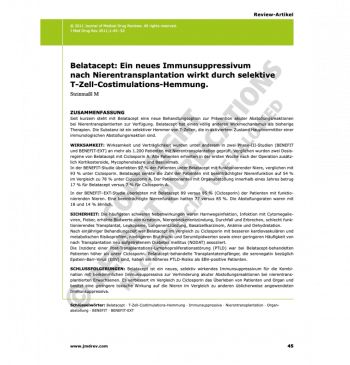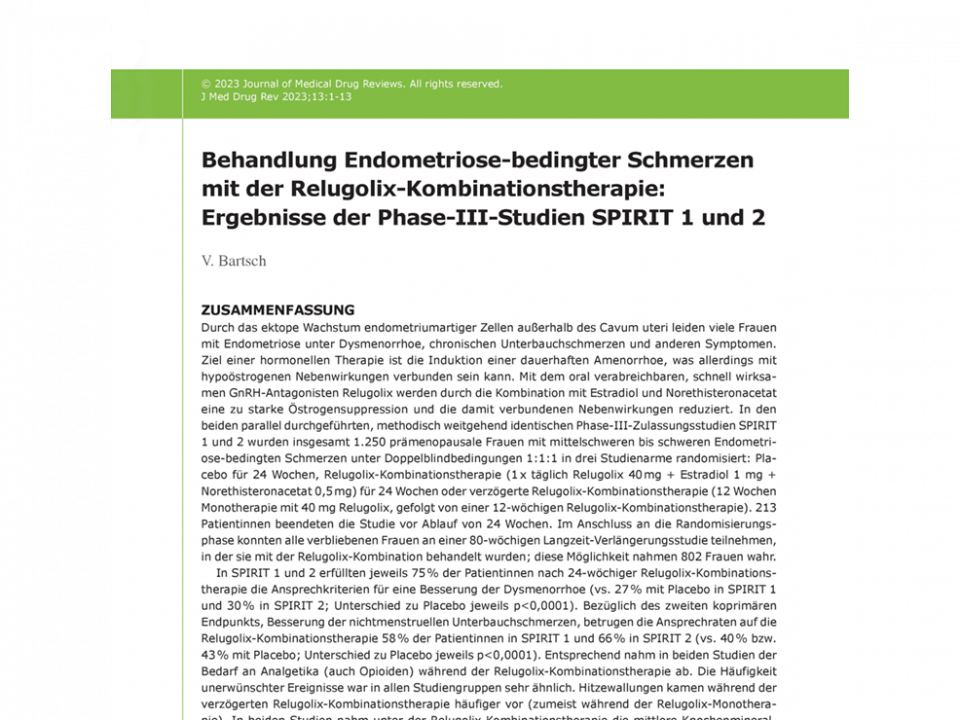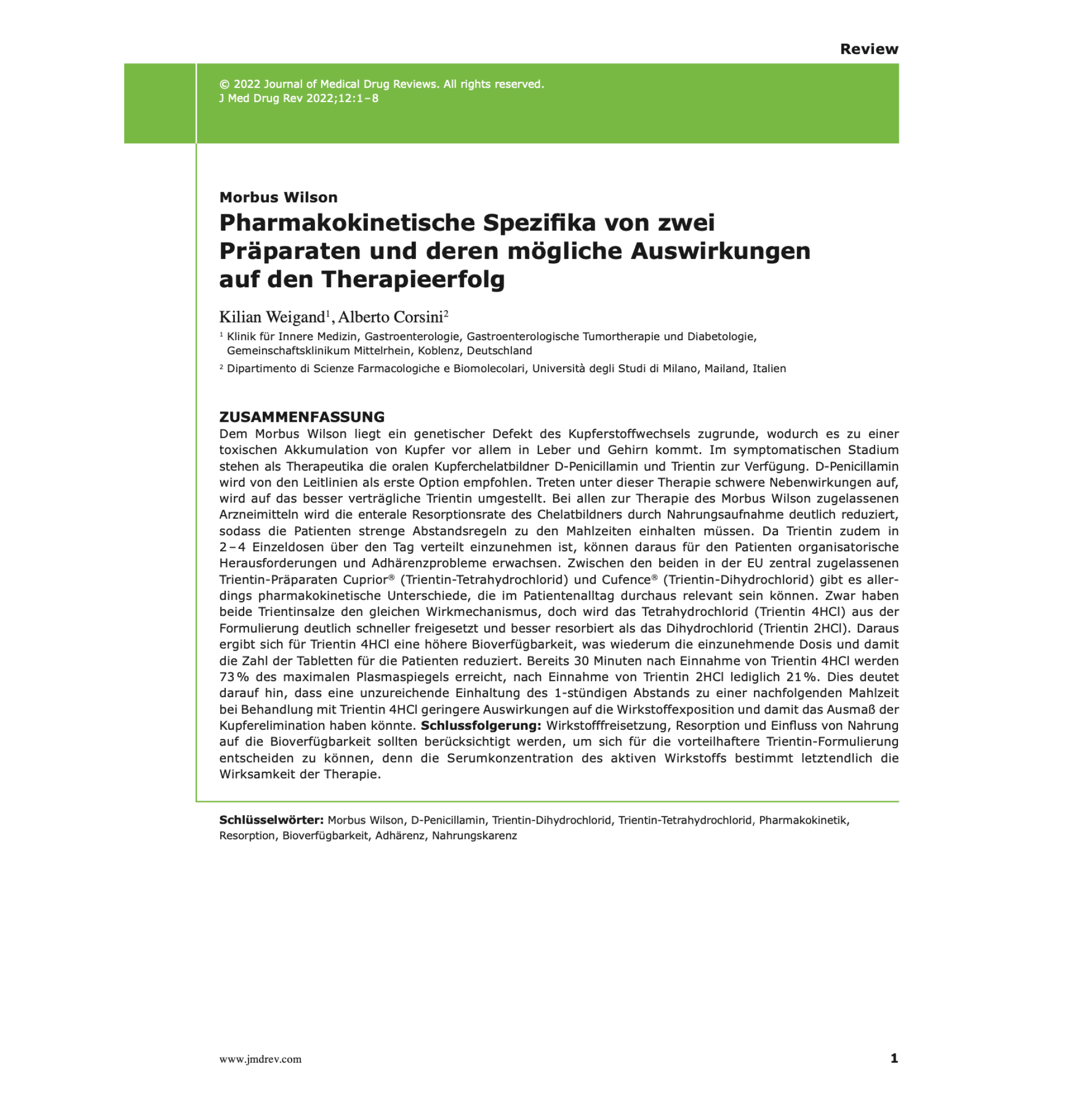Belatacept A new immunosuppressant after kidney transplantation acts via selective T-cell costimulation inhibition.
J Med Drug Rev 2011;1;45-52
(Review-Artikel in deutscher Sprache)
Belatacept is a new treatment option for the prevention of acute organ rejection in patients after kidney transplantation. Its mode of action totally differs from all known therapies. Belatacept is a selective blocker of T-cell activation, which plays a big role in transplant rejection.
EFFICACY: Efficacy and tolerability were assessed among others in two phase III studies (BENEFIT and BENEFIT-EXT) with more than 1200 patients after kidney transplantation, comparing two dose regimens of belatacept versus cyclosporine. During the first week after transplantation each patient was additionally treated with corticosteroids, mycophenolate mofetil, and basiliximab.
In the BENEFIT trial 97 % of patients treated with belatacept survived with maintained renal function, compared to 93 % with cyclosporine. Belatacept reduced the proportion of patients with impaired renal function to 54 %, compared to 78 % with ciclosporine. The proportion of patients with organ rejection within one year was 17 % for belatacept and 7 % for cyclosporine.
In the BENEFIT-EXT trial 89 % of patients treated with belatacept survived with preserved renal function, compared with 85 % (cyclosporine). Renal impairment was found in 77 versus 85 % of patients. The rate of rejections was comparable (18 versus 14 %).
SAFETY: The most common serious adverse reactions reported with belatacept are urinary tract infection, cytomegalovirus infection, pyrexia, increased blood creatinine, pyleonephritis, diarrhea, vomiting, graft dysfunction, leucopenia, pneumonia, basal cell carcinoma, dehydration.
At 1 year posttransplant belatacept demonstrated an improved cardiovascular and metabolic profile compared with cyclosporine, lower levels of blood pressure and serum lipids, and a lower incidence of new onset diabetes (NODAT).
More belatacept-treated patients developed posttransplant lymphoproliferative disorder (PTLD), compared with cyclosporine. Belatacept-treated transplant recipients with Epstein-Barr virus (EBV) negative serology have a higher risk for PTLD than EBV seropositive patients.
CONCLUSIONS: Belatacept is a new, selective immunosuppressant, indicated in combination with standard immunosuppressants for prophylaxis of acute graft rejection in adults receiving a renal tranplant. Belatacept is associated with an increased patient and graft survival and less nephrotoxicity as compared to other commonly used immunosuppressants.
(Review-Artikel in deutscher Sprache)
Belatacept is a new treatment option for the prevention of acute organ rejection in patients after kidney transplantation. Its mode of action totally differs from all known therapies. Belatacept is a selective blocker of T-cell activation, which plays a big role in transplant rejection.
EFFICACY: Efficacy and tolerability were assessed among others in two phase III studies (BENEFIT and BENEFIT-EXT) with more than 1200 patients after kidney transplantation, comparing two dose regimens of belatacept versus cyclosporine. During the first week after transplantation each patient was additionally treated with corticosteroids, mycophenolate mofetil, and basiliximab.
In the BENEFIT trial 97 % of patients treated with belatacept survived with maintained renal function, compared to 93 % with cyclosporine. Belatacept reduced the proportion of patients with impaired renal function to 54 %, compared to 78 % with ciclosporine. The proportion of patients with organ rejection within one year was 17 % for belatacept and 7 % for cyclosporine.
In the BENEFIT-EXT trial 89 % of patients treated with belatacept survived with preserved renal function, compared with 85 % (cyclosporine). Renal impairment was found in 77 versus 85 % of patients. The rate of rejections was comparable (18 versus 14 %).
SAFETY: The most common serious adverse reactions reported with belatacept are urinary tract infection, cytomegalovirus infection, pyrexia, increased blood creatinine, pyleonephritis, diarrhea, vomiting, graft dysfunction, leucopenia, pneumonia, basal cell carcinoma, dehydration.
At 1 year posttransplant belatacept demonstrated an improved cardiovascular and metabolic profile compared with cyclosporine, lower levels of blood pressure and serum lipids, and a lower incidence of new onset diabetes (NODAT).
More belatacept-treated patients developed posttransplant lymphoproliferative disorder (PTLD), compared with cyclosporine. Belatacept-treated transplant recipients with Epstein-Barr virus (EBV) negative serology have a higher risk for PTLD than EBV seropositive patients.
CONCLUSIONS: Belatacept is a new, selective immunosuppressant, indicated in combination with standard immunosuppressants for prophylaxis of acute graft rejection in adults receiving a renal tranplant. Belatacept is associated with an increased patient and graft survival and less nephrotoxicity as compared to other commonly used immunosuppressants.




